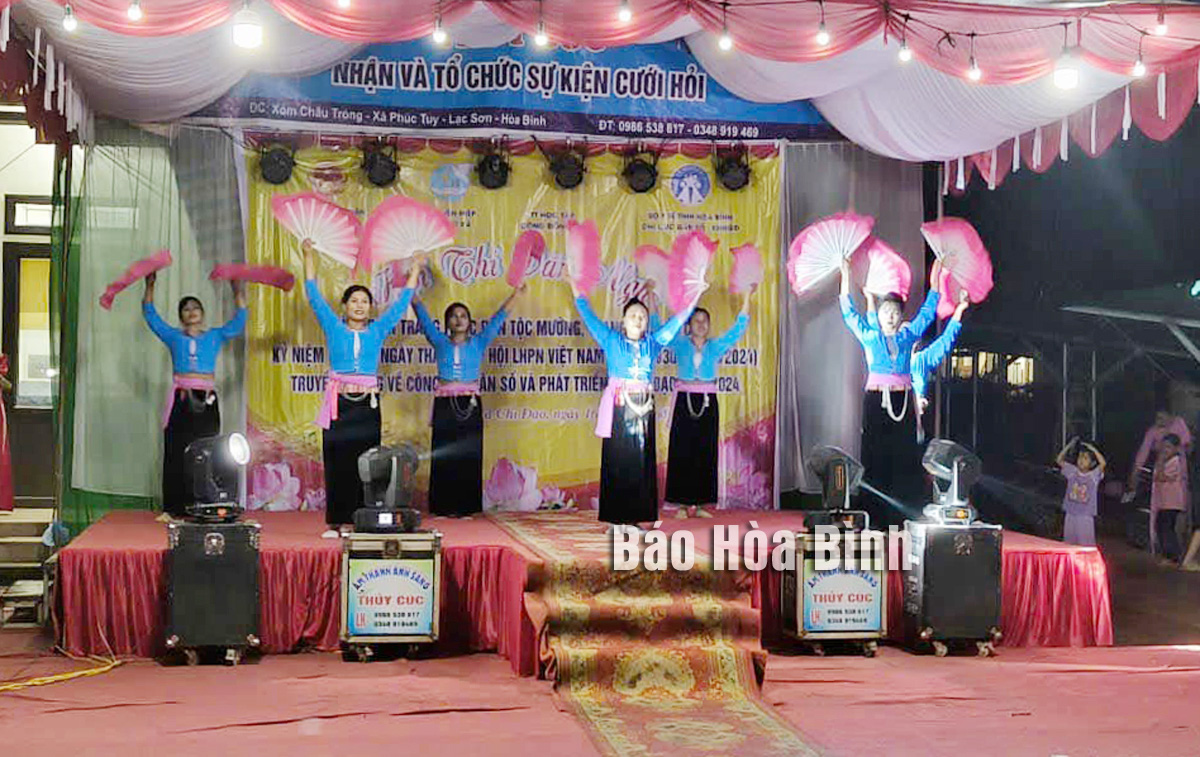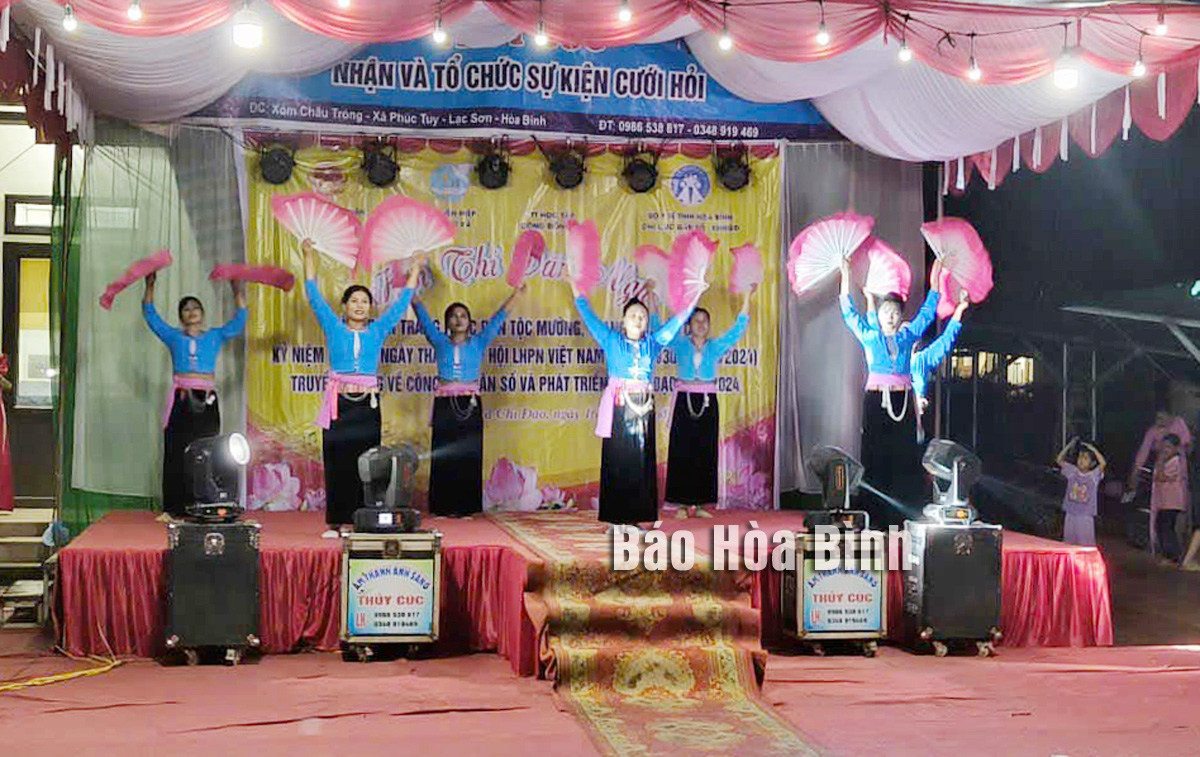
Hoa Binh province has shown strong performance in family planning by effectively implementing directions and plans in the field, including Directive No. 12/CT-UBND issued by the Chairman of the provincial People’s Committee on August 4, 2021 on rolling out measures to maintain the policy of each couple having two children, which is stated in community rules and the regulations of agencies, organisations, and units across the province of Hoa Binh for the 2021 – 2025 period.
The efforts have contributed to fulfilling
objectives outlined in the Action Plan No. 56/KH-UBND, released by the
provincial People's Committee in March 2021 for the implementation of Vietnam's
Population Strategy for the 2020 - 2025 period, with a vision until 2030. The
goal is to continue reducing birth rates, ensuring and firmly maintaining a
replacement-level fertility rate, and rapidly bringing the overall fertility
rate of the entire province to the replacement level by 2025.
The Hoa Binh Population and Family Planning Sub-Department, in
coordination with the Women’s Union of Chi Dao commune of Lac Son district
organised an art competition and population policy communication programme.
Nguyen Thi Minh Phuong, Director of the provincial Population and Family
Planning Sub-Department, stated that over the past three years, the
implementation of Directive No. 12 has achieved notable results. The provincial
Steering Committee for Population and Development Affairs has established two
inter-agency inspection teams, carrying out two rounds of inspections in 2022
and 2023, evaluating eight district and city Population Steering Committees,
four departments, and some affiliated units; 14 commune-level Steering
Committees; and 42 villages. Previously, the district and city-level Population
and Development Steering Committees had conducted inspections and evaluations
of the Steering Committees at the commune, ward, and town levels. In 2024, 10
workshops have been held at various districts and cities, attended by 401
delegates. These workshops focused on discussing solutions to difficulties in
incorporating population policy content into local community rules and
coordinating 12 key meetings at the commune level to pilot the implementation
of specific measures to address violations related to the birth of a third or
subsequent child. Additionally, Guideline No. 207 on measures to address
violations of population policy has been implemented to help localities
incorporate these policies into community rules and the regulations of agencies
and organisations.
Despite the achievements, implementing Directive No. 12 still faces several
challenges. In some localities, the deep-rooted preference for sonshas
driven many families to intentionally have a third child. Some regulations in
community rules remain vague and lack deterrent power. The absence of financial
penalties or material sanctions also poses a barrier to addressing violations.
Furthermore, many agencies, units, and localities face difficulties and
uncertainty in developing measures to enforce the family planning policy due to
the lack of detailed guidelines and a failure to properly research and apply
new legal documents.
To address these difficulties, the provincial
Population and Development Steering Committee has proposed creative solutions
and approaches. During workshops, several suggestions were made, setting the
stage for enhancing the effectiveness of the population policy, such as
implementing mechanisms to handle violations, and extending the time for salary
increases or withholding rewards for those who commit violations. In some
localities, voluntary measures, such as contributions to welfare project funds,
have been introduced. Moreover, attention has been paid to the communications
work, aiming to change attitudes, and reduce gender bias. Besides, various
cultural activities, workshops, and competitions on population policy,
especially in ethnic minority areas, have been held.
Phuong said over the past 10 years, the rate of third-child births has
consistently increased from 5.6% in 2012 to 18.1% in 2022. However, since 2021
when the Directive No. 12 took effect, the rate fell to 17.2% in 2023, and is
expected to be 17% in 2024. This has contributed to a reduction in the average
number of children per couple, from 2.34 in 2019 to 2.17 in 2023, with a target
of 2.1 by 2025.
With an increasingly vibrant and widespread emulation movement aimed at building cultured residential areas and cultured families, Yen Thuy District has been making steady progress toward improving both the material and spiritual well-being of its people, while fostering a civilized, prosperous, beautiful, and progressive community.
Once lacking recreational spaces and community facilities, Residential Group 2 in Quynh Lam Ward (Hoa Binh City) has recently received attention for the construction of a new, spacious, and fully equipped cultural house. The project followed the model of state support combined with public contributions in both labor and funding.
The "All people unite to build cultural life" movement, which has been effectively integrated with Kim Boi district’s socio-economic development goals, is fostering a lively spirit of emulation across local residential areas, hamlets, villages, public agencies, and enterprises. In addition, through the initiative, traditional cultural values are being preserved and promoted, while community solidarity and mutual support in poverty reduction and economic development are being strengthened.
A working delegation of the Hoa Binh provincial People’s Committee led by its Permanent Vice Chairman Nguyen Van Toan on June 11 inspected the progress of a project to build the Mo Muong Cultural Heritage Conservation Space linked to tourism services in Hop Phong commune, Cao Phong district.
Born and growing in the heroic land of Muong Dong, Dinh Thi Kieu Dung, a resident in Bo town of Kim Boi district, in her childhood was nurtured by the sweet lullabies of her grandmother and mother. These melodies deeply imprinted on her soul, becoming an inseparable part of her love for her ethnic group's culture. For over 20 years, this love for her hometown has driven Dung to research, collect, and pass down the cultural values of the Muong people to future generations.
In the final days of May, the Ethnic Art Troupe of Hoa Binh Province organized performances to serve the people in remote, mountainous, and particularly disadvantaged areas within the province. These were not just ordinary artistic shows, but they were the meaningful journeys aimed at spreading cultural values, enhancing the spiritual life of the people and contributing to the preservation of ethnic minority cultural identities.



